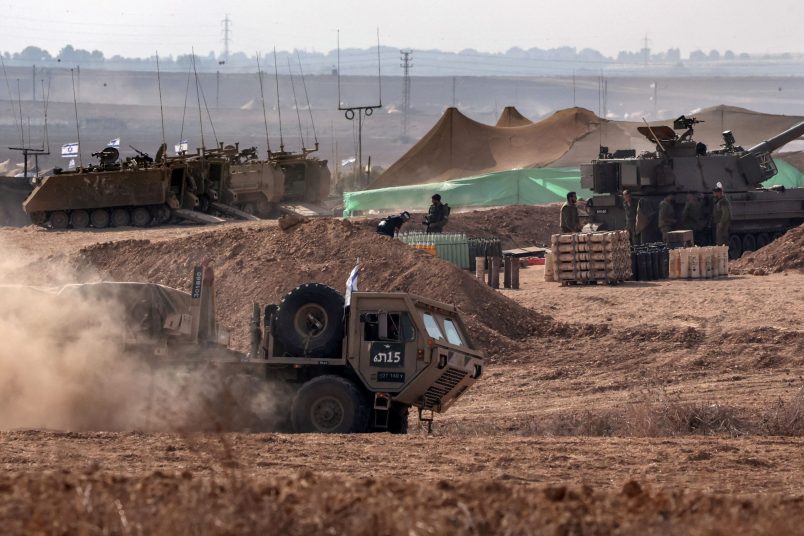I want to note several interconnected developments in the news coming out of the Middle East today.
Already battered by his ongoing criminal prosecution and attempted judicial coup, Benjamin Netanyahu’s standing with the Israeli public appears to have been shattered by the October 7th massacres in southern Israel. In such a perilous position, Netanyahu’s allies in and out of government have been spreading various stab-in-the-back type storylines seeking to evade responsibility for the events of October 7th.
The best way I can describe this is that Israel has its own version of the Fox News-rooted right wing big lie machine that Americans are familiar with here. That has been in overdrive for the last three weeks. It has included the government briefing reporters against the country’s security establishment, placing the blame for the massacres squarely on the IDF and Shin Bet, the country’s domestic intelligence and security service.
This is just one example of how Netanyahu’s continued tenure in office has genuinely existential stakes for Israel. Netanyahu has always been known as a conniving and manipulative figure. Lots of successful politicians have been. But in a moment of profound national crisis it is a huge liability for a country to be led by a man who faces dire risks to his reputation, power and liberty that have nothing to do with solving the crisis at hand.
Today Anshel Pfeffer, a reporter with the liberal daily Haaretz, writes that the government’s briefing against the country’s defense establishment has started pushing a new line: the generals don’t care about limiting IDF casualties. They are trying to rush into a ground invasion before using bunker-busting bombs to do as much damage as possible to Hamas’s network of underground tunnels. In return, the defense establishment started briefing a counter-message. They didn’t attack or name Netanyahu directly, but said simply that they are merely following the government’s orders.
The gist seems to be this. The government ordered an all-out mobilization with all that that entails: a massive reserve call up, securing borders, assembling all the resources for a ground invasion. As a strictly military matter if you get everything prepared and ramped up and then wait, eventually your readiness and effectiveness starts to decline. So what the military seems to be saying is: You told us to get everything ready to move right away. We did. So we need to move now. But the government isn’t quite ready.
There are lots of different considerations at play on both sides of this equation, many of them reasonable, others less so. The fact that there is so little trust between the two sides at such a moment of national crisis is a big deal in itself. But we can get some visibility into what’s happening here from what may seem like a very different side of the story.
President Biden has made a huge and public show of support for Israel. Increasingly in both countries it’s been seen as a bear hug of sorts: an enveloping embrace, promises of money, arms, strategic military support and more, and yet focused in many ways on not just supporting but exercising control over Israel’s coming ground invasion. Key U.S. goals are keeping Israel focused on limiting civilian casualties and figuring out a political solution for Gaza after Hamas. If Gaza is left in anarchy after Hamas is toppled or put back under Israeli military occupation, even the most successful military operation will just delay a return to some version of October 6th, the day before the attacks.
But the U.S. also has more concrete and immediate goals, which seem to be playing at least some role in the delay of a ground operation. One is the desire, already getting some play in the U.S. press, to negotiate the freedom of more hostages before a ground campaign begins. But a more immediate issue is beefing up the defenses of U.S. military forces in the region. This is something getting a lot less attention in the U.S. press.
There is a huge fear in U.S. military and defense policy circles today that the Israel-Hamas war will skid out of control into a regional war that will bring Iran and the U.S. directly into the conflict. For a taste of this, read Tom Friedman’s column from late last week. It’s a genuinely frightening read. The U.S. is presently rushing lots of resources into the region both to deter attacks on U.S. forces by Iranian proxy militias in Lebanon, Syria, Iraq, Yemen and other countries and if necessary retaliate against them. It’s become more clear to me in recent days that those two carrier groups sent to the region aren’t there just to deter Hezbollah and Iran from attacking Israel but to deter attacks on U.S. military forces throughout the region.
Many factors figure into Israel’s decision of when to begin a ground invasion. I can’t say delays are because of this specifically. But it seems certain that the U.S. rush to reinforce its deployments in the region is playing at least some role in the delay. To return to our earlier topic, this is a clear reason why the political and military leaderships in Israel could be reacting to very different priorities at the moment.


 Member Newsletter
Member Newsletter
